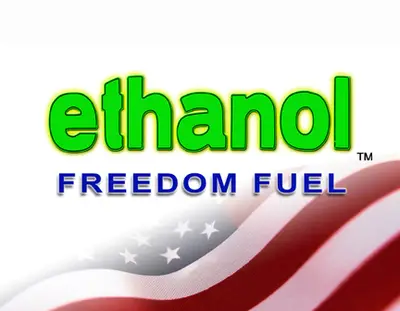EPA Finally Makes Positive Decision - Ethanol Industry Rejoices - Oil Industry Preparing New Lies and Misinformation
 |
November 2016: A Great Month For America
By Marc J. Rauch
Exec. Vice President/Co-Publisher
THE AUTO CHANNEL
 Marc Rauch |
This morning, the Environmental Protection Agency issued some welcome good-health, pro-biofuel decisions that spells Happy Thanksgiving and portends a bountiful year for America.
"The U.S. Environmental Protection Agency (EPA) today finalized increases in renewable fuel volume requirements across all categories of biofuels under the Renewable Fuel Standard (RFS) program. In a required annual rulemaking, today’s action finalizes the volume requirements and associated percentage standards for cellulosic biofuel, advanced biofuel, and total renewable fuel for 2017, and for biomass-based diesel for 2018."
Janet McCabe, the agency’s acting assistant administrator for the Office of Air and Radiation said, “Renewable fuel volumes continue to increase across the board compared to 2016 levels. These final standards will boost production, providing for ambitious yet achievable growth of biofuels in the transportation sector. By implementing the program enacted by Congress, we are expanding the nation’s renewable fuels sector while reducing our reliance on imported oil.”
Joyous comments have been pouring in from all sectors of the biofuel community:
POET CEO Jeff Broin wrote, "The grain ethanol industry is ready and able to meet its obligation under the Renewable Fuel Standard, and today's rule from the EPA reflects that reality. I commend the EPA on holding firm to the letter of the law despite enormous pressure from oil interests. These numbers reflect the intent of Congress in making homegrown, renewable biofuels a sizable portion of our transportation fuel supply. Biofuels like ethanol improve our energy security, replace cancer-causing chemicals in gasoline and reduce greenhouse gasses. Biofuels drive rural economies across the Midwest, and today's announcement is welcome news for those areas in particular. We must continue to grow the market for biofuels so that we can bring safer, cleaner fuels to America. The EPA's numbers do just that." Emily Skor, CEO of Growth Energy, issued this statement, “We are pleased that the EPA’s rule finally achieves the statutory volume for conventional biofuel as called for by Congress. The Renewable Fuel Standard is our country’s most successful energy policy. It continues to inject much needed competition and consumer choice into the vehicle fuels marketplace. It enables greater consumer adoption of cleaner biofuels that displace toxic additives and reduce harmful emissions, while creating American jobs, spurring innovation and lowering the price at the pump. Today’s announcement by the administration validates the critical importance of cleaner burning, less expensive biofuels, like ethanol. The American ethanol industry is a true success story, and with increased volumes, producers can unleash their full potential to ensure that higher blends, such as E15, are available to consumers and producers can continue to innovate by developing 21st century fuels for 21st century cars. This announcement is a win for our energy security, the environment, the American consumer and American innovation. We look forward to working with EPA, as well as the incoming Trump administration, to ensure the continued successful implementation of the RFS."
RFA President and CEO Bob Dinneen called the EPA a win for consumers. "What this means is that there will be additional gallons of high octane, low cost renewable fuels like ethanol available in the marketplace and consumers are going to benefit." He also said it sends a strong single to investors that the EPA is behind this program and they can "invest with confidence with next generation biofuels and invest in confidence in the infrastructure to accommodate higher level blends. Because EPA with this rule is clearly demonstrating that it is not going to be looking backwards as API would like and is looking forward."
Brian Jennings, the executive vice president of the American Coalition for Ethanol (ACE) said, "For the last couple of years, EPA has unfortunately sided with oil companies and refiners instead of rural voters to ‘ride the brakes’ on RFS blending volumes, relying on excuses such as the make-believe E10 ‘blend wall’ and lower gasoline use to reduce renewable fuel use below statutory levels. But we are supportive of the move to increase volumes for 2017 without a ‘blend wall’ excuse. U.S. gasoline use is expected to rise again in 2017, so increasing RFS volumes will help restore some confidence to the rural economy and reassure retailers that it makes sense to offer E15 and flex fuels like E30 and E85 to their customers."
Brooke Coleman, Executive Director of the Advanced Biofuels Business Council, added, “Administrator McCarthy and her team deserve a lot of credit. Administrator McCarthy said they would get the RFS back on track and they did. It’s a strong rule across the board and moves the conversation forward. We have moved past the imaginary blend wall. The biofuels industry continues to innovate. The merchant refiners saying they cannot comply with the RFS are now implementing cost-effective changes at their refineries to blend more renewable fuel. President-elect Trump will no doubt hear from a shrinking group of RFS naysayers, but I think he understands that the RFS is working, supports a strong manufacturing base across the country and reduces our dependence on foreign oil. We are looking forward to working with EPA and the next Administration on further accelerating the commercial deployment of advanced biofuels.”
Wesley Spurlock, farmer and President of National Corn Growers Association stated, "Today the EPA moved in the right direction by increasing the 2017 ethanol volume to statute. This is critical for farmers facing difficult economic times, as well as for consumers who care about clean air, affordable fuel choices, and lowering our dependence on foreign oil."
Meanwhile, the petroleum oil industry is no-doubt huddling around their book of evil incantations trying to fabricate some new lies to feed the public. If they work according to schedule, they will release some poisonous, flatupendantic* statement late Friday when no one can rebut it until after the weekend.
As I always say: I'd much rather my fuel money go to American farmers than to foreign dictators and terrorists.
*I invented the word "flatupendantic" several years ago. It means "full of hot air" or to put it in bovine terminology, "bullshit."
SEE ALSO: Truth About Ethanol


